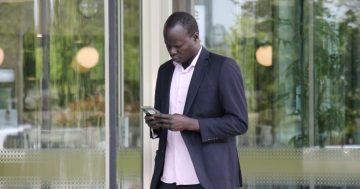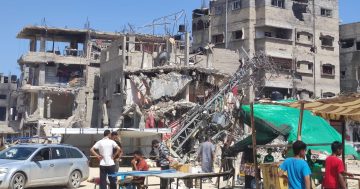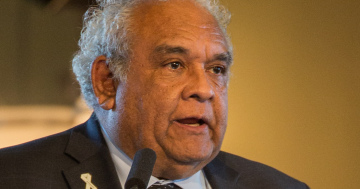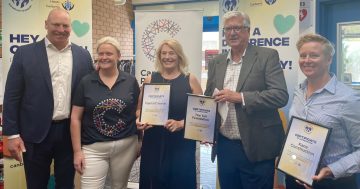
Fighting is taking place in residential areas of Sudan’s capital, Khartoum, where Souzan Kareem’s family lives. Photo: Souzan Kareem.
“It is the holy month of Ramadan, a time for peace and reflection for the Muslim community. Yet Sudanese communities all over the world, including here in Canberra, are unable to sleep let alone find peace, for fear of what their families in Sudan are going through,” Souzan Kareem wrote on 20 April – five days after war erupted in the country.
Conflict broke out on 15 April between two rival factions, backed by the army and the paramilitary Rapid Support Forces, respectively. While a three-day ceasefire was agreed on 24 April and later extended, the fighting has continued, threatening the lives of civilians on the ground, such as Souzan’s family.
Souzan was born in Sudan’s capital, Khartoum, and moved to Australia in 2002 with her young son. She has lived in Canberra for more than a decade and has worked in the community sector in Australia for 15 years. She calls Australia home, but it has become even more difficult to be apart from her family now as she fears for their safety every day.
Since last Saturday, civilians in Khartoum and other parts of the country have found themselves in a war zone, with fighting taking place in residential urban areas.
“They’re waging war in a densely populated area … Just like if innocent people were being shot in the suburbs of Canberra,” Souzan said.
“I live in constant fear for them. There’s bullets coming from all directions, people hiding under their beds from bombs, dead bodies lying on the ground, hospitals bombed, homes bombed, no access to medical care, no access to the internet.
“It’s a complete nightmare over there.”
Upwards of 500 people have been killed and 4200 injured since 15 April, but those numbers may be much higher – many civilians are unable to access medical care, and hospitals have been bombed.
More than 13,000 kilometres away, Souzan and other members of Canberra’s Sudanese community are living in uncertainty and desperately trying to stay in contact with their families. The war has taken over their lives.
“Even though we are far away from the war zone, you cannot disconnect,” she said.
Souzan spends so much time trying to make contact with her family in Khartoum that she feels as though she’s there with them. The sound of planes flying overhead is triggering to her – she has to remind herself that she is in Canberra, safe and far away from the conflict.
“I hear a loud noise and it makes me jump, it takes me a second to realise I’m not actually in the war zone, I’m safe. You can’t disconnect,” she said.
Amid the despair and uncertainty, though, there is hope: a grassroots movement is taking shape in Khartoum and people on the ground have assembled to help each other and distribute vital supplies such as water and medication, as well as to spread information and messages about safe routes out of the city.
Souzan says these stories are often ignored by the media, which often focuses instead on giving a platform to the fighters. She wants people to know that “in the middle of the chaos, destruction and blood” there are “amazing effects on the ground”, in the absence of any official support for the civilians caught in the conflict – these are the “true heroes”.
“This is the face of revolution, and of hope, this is communities supporting each other for survival,” she said. “We want people to know that Sudan is not a country without hope, one to be dismissed as a place of ongoing conflict that nothing can be done about … These are the people the international community should be supporting.”
Canberra is home to a small Sudanese community in comparison with Australia’s larger cities, and Souzan says many people aren’t aware of what is happening.
“Sudan is far away, there is no news … and media coverage is selective,” she said. “We need people to know what’s happening, and we need the Australian Government to help.”
The Canberran Sudanese community and humanitarian organisations such as Amnesty International are calling for the Australian Government to do more to support Sudanese Australians and their families, particularly those looking to be evacuated from the country. While Prime Minister Anthony Albanese announced that nearly 70 Australians had safely been evacuated from Sudan, many others remain stranded.
Souzan urged Canberrans to stand with the Sudanese community and put pressure on the Government to increase its efforts to provide assistance and call for a further ceasefire.
“We can all play a part in this, we can amplify our voice and call for a ceasefire. This can all be done by local people in Canberra.”



















